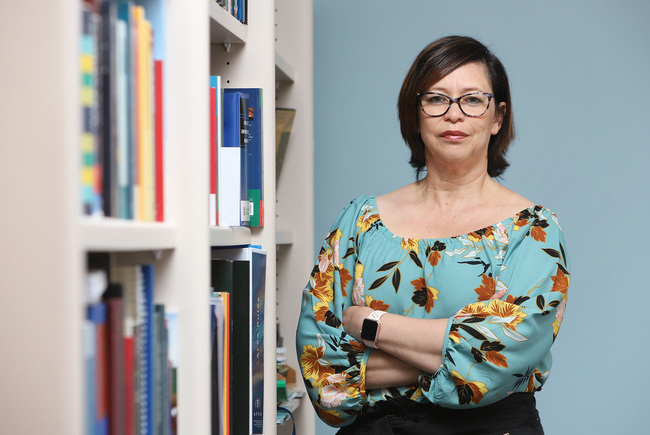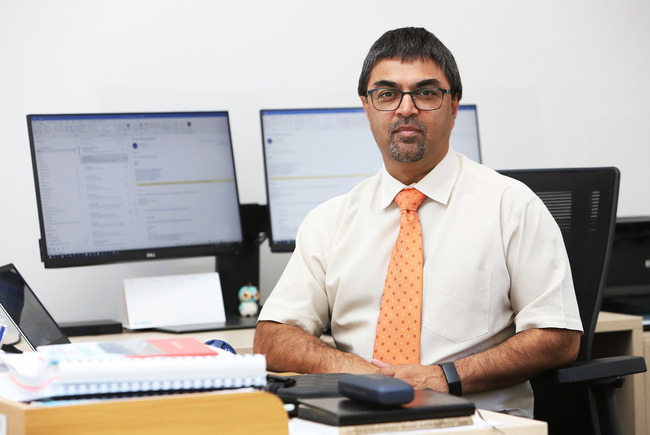How UCT is supporting research work during COVID-19
23 April 2020 | Professor Sue Harrison
Dear UCT colleagues
As we end the fourth week of the COVID-19 lockdown, we have all been expanding our skills in living in uncertainty, skills we will find useful in our future world. This uncertainty also impacts on many aspects of our research work. I am focusing in this DVC Desk on a number of impacts of COVID-19 on research at UCT and the actions we have been taking to support our researchers.
For many of us, these past four weeks have been dominated by moving our undergraduate and taught postgraduate curricula online to emergency remote teaching, supporting our postgraduates, contributing to establishing support systems within UCT to handle the pandemic and handling family responsibilities. For others, their work is at the COVID-19 coalface or in COVID-19-focused research. That being said, the lockdown period can be a time for researchers to get to those many aspects of research, such as reviews, reports and papers, which our usually hectic schedules and daily commutes often don’t allow. We know that many of you are taking advantage of this time, both by the substantial activity on our electronic research administration system (eRA) and the many approaches to our grant-writing teams. It is encouraging to see that so much of UCT’s research focus is continuing through this difficult time.
However, there are areas that are causing significant stress for many researchers that we need to address to keep the research enterprise strong. Almost all our researchers and postgraduates are impacted by lack of access to labs, studios and fieldwork sites; soft-funded researchers have heightened concerns because delivery of their projects directly impacts the funding available for their income; postdoctoral research fellows feel the stress of a limited time window to build themselves as experts in their fields; and postgraduates are concerned about their ability to complete their studies on time before funding runs out.
Funding and contracts
Of immediate concern to the research community is the effect of the lockdown on research contracts and the need to secure ongoing funding. The Research Contracts and Innovation Office (RC&I) have engaged proactively with sponsors and funding agencies to understand the impact of delays on existing contracts for projects based on laboratory or field work, the potential to extend these contracts and the possibility of costed extensions. Most of our funding partners have been pro-active in acknowledging the impact of the pandemic on research that they support and outlining their approach to supporting researchers through this challenging period. A limited number are open to providing additional support for extended salaries; others are willing to allow continued expenditure on salaries but require researchers to remain within budget. We continue to gather further information as it becomes available. Details of funders’ approaches are provided on the RCI website. A useful resource has also been supplied by Nature.
Ensuring the financial stability of our research enterprise is a top priority. I have established a research task team to identify potential routes to support both soft-funded and GOB research teams during this difficult time. We recognise the differing challenges for these teams. To help us tackle this together, I urge principal investigators who have been approached to respond to the information on contracts requested from RC&I. Pro-actively reviewing the impact of COVID-19 on their research and research funding, while thinking through scenarios and plans to work through this period, will help individual researchers and research entities as well as the university.
Engaging with government and funders
The country’s university sector has, through Universities South Africa (USAf), joined forces to deal with many aspects of the COVID-19 pandemic. There has also been sectoral engagement on the provision of critical resources such as liquid nitrogen and maintenance of sensitive lab systems, and the zero-rating of academic websites. In addition to the latter, UCT has made 30GB of data available to all students currently in SA. It is anticipated that USAf will continue similar engagements with other national funding agencies such as the Medical Research Council.
Extended deadlines for NRF grants applications
The NRF has extended the submission deadlines for grant proposals that were scheduled to close on 30 April to 15 May 2020.
The current extension applies to all grant categories and details can be found on the research support hub. Researchers should note that the NRF Online Submission System will not accept applications beyond 15 May and no amendments can be made on applications after this date.
Researchers who still require internal review feedback from the Research Office are requested to comply with the new internal deadline of 4 May as no further extensions will be granted.
This announcement comes when the Research Office is in the process of reviewing applications that were submitted for internal review on 13 and 17 April. Applicants who had met these internal deadlines can still expect feedback this week and next week.
Any enquiries on NRF grants must be addressed to the contact persons listed next to each grant as indicated in the Current Funding Opportunities page.
Libraries
Our libraries continue to work as virtual libraries. They are maximising open access resources for us through engaging with counterparts worldwide and entering agreements that expand our online access resources. Our librarians are available every day for queries and to help researchers access materials. This is a wonderful resource to support our ongoing research.
Communication with postgraduates
A DVC Desk was sent to postgraduates on Monday, 20 April that addressed a range of issues, including challenges with taught courses, research degrees and international students, and alerted them to various resources and sources of information.
Your postgraduates are also receiving regular postgraduate announcements, the most recent announcing the development of a page of COVID-19 frequently asked questions (FAQs).
NRF postgraduate funding call 2021
All postgraduate supervisors should be aware that the NRF postgraduate funding call for 2021 has opened.
This year there are many changes in this call, including the need for all postgraduate applicants, whether supported through what was previously a free-standing or a grant holder bursary, to apply through this call. The details are outlined in a recent postgraduate announcement, and it is important to note the UCT internal deadline of 30 June for most of the master’s and doctoral applications.
As part of this new policy, the South African Research Chairs Initiative (SARChI) and Centre of Excellence bursaries will be processed through this call, and not separately as in the past. It is therefore a key call for students and supervisors alike. Academics and self-funded researchers are encouraged to recruit postgraduate students for 2021 as early as possible this year to accommodate these timelines – a challenge amidst the COVID-19 lockdown.
Application for NRF bursaries, where students are eligible, is a prerequisite to be considered for UCT postgraduate funding through the 10A application.
Further information
Please do watch the research announcements published every two weeks for new funding opportunities and new research support and activities.
We have also developed a selection of FAQs around aspects of research at UCT that aim to support researchers during this unusual period.
I wish you good health and strength over the period of continued lockdown and beyond. May we all experience ‘business unusual’ in an innovative manner. We all recognise that the COVID-19 pandemic represents a sea-change in our way of functioning and opens opportunities for us to use this experience to stimulate change towards a new ‘future normal’. Each of us – the research support staff, GOB academics, soft-funded and postdoctoral research fellows and postgraduates – is well positioned to think out of the box and propose innovative approaches through and to our research at UCT.
Warm regards
Professor Sue Harrison
Deputy Vice-Chancellor: Research and Internationalisation
Read previous communications:
 This work is licensed under a Creative Commons Attribution-NoDerivatives 4.0 International License.
This work is licensed under a Creative Commons Attribution-NoDerivatives 4.0 International License.
Please view the republishing articles page for more information.
Listen to updates from the executive
The executive communications in this selection include an audio recording of a summary of the content for your listening convenience.


























.jpg)